Dominican Republic, one month after the Jet Set collapse: ‘It changed our lives forever’
The municipality of Haina lost 25 residents in the nightclub tragedy, which left 233 dead. The country is demanding justice without yet knowing exactly who was to blame
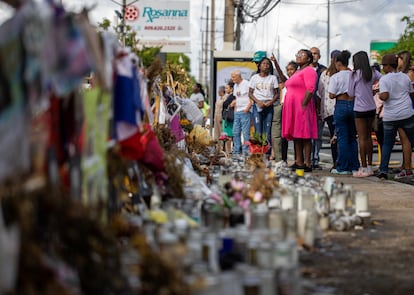

He shouted her name at the top of his lungs. “Clarisleny, are you there?” he asked several times. “Please tell me you’re okay.” His voice was strong, even though his entire body was buried beneath the walls and columns of the Jet Set nightclub. With his left hand, Anastasio Peguero caressed his wife’s legs and removed the iron straps that were scratching her feet. With his right hand, he lifted the beam that was crushing the chest of Victor, an acquaintance who died after 13 hours trapped in the rubble. After calling his 20-year-old daughter, he gave up trying. “I didn’t want my wife to realize what I feared most,” he says a month after the collapse, his legs still swollen and his gaze still searching for his little princess.
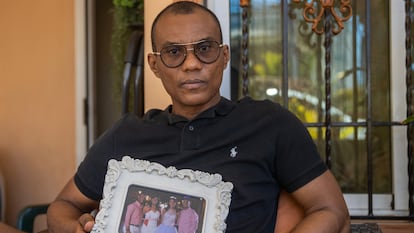
Everything happened quick as lightning. One moment he was sitting at one of the central tables listening to Rubby Pérez sing Color de Rosa; the next, everything went dark. There was no time to react. In milliseconds, the ceiling of the legendary Dominican nightclub was falling on top of some 500 people. Some managed to run away when they saw a small amount of sand falling, while others died instantly. Peguero, 54, pulled his cell phone out of his pocket as best he could and managed to turn on the flashlight, seeing the scenes of a massacre. “You could hear people screaming in pain and asking for help. As the hours passed and no one arrived, many shouted, ‘Are they going to let us die? Are they going to let us die?’ It was horrifying,” he recalls.
As he recounts the fateful dawn of April 8, he waves to a group of neighbors, relatives, and friends who are taking advantage of this bank holiday Monday to take turns to keep the family company. No one dares to ask him how he is feeling. They hug him silently with the affection of those who have known each other their whole lives, and smile sadly. “Go on, Sorayda [his sister] is in there,” the engineer tenderly tells a woman whose eyes fill with tears upon seeing him.
In Haina, a municipality half an hour from the capital, the grief is collective. Twenty-five of the 233 victims hailed from here; it’s the town with the highest death toll relative to its population. The famous merengue singer Rubby Pérez, 11 senior citizens from the Haineros Dorados club, the mother of a violinist, the baseball player Tony Blanco, a teacher, a dancer... “It changed our lives forever,” whispers the father. The disaster also left nearly 200 people in hospital, three of whom remain in public health centers. Most are recovering psychologically and physically at home.
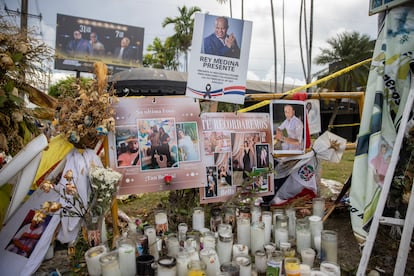
Haina is the mirror of an entire country. A month ago, the Dominican Republic woke up to images of the collapse and a thousand questions popped up. How could a roof of that size have completely collapsed? Who is responsible? The questions mounted amid stretchers carrying confused, sun-dazed victims and firefighters pleading for silence to hear the cries of the survivors. Could it have been avoided? Does the fault lie with the owner of the establishment, Antonio Espaillat? Or with the state authorities? The weight of these questions is felt in every corner of the municipality; Haina is a town that has fallen silent. Until a few days ago, no one dared to honk their horns from any car or balcony. “No one was in the mood for anything. We are close-knit people and we all know each other. Four died on this street; on the one below, 10 more,” laments a woman strolling under an umbrella that shields her from the sun. The silence, rarely seen in this country’s neighborhoods, is suddenly broken by Rubby’s songs at full volume, turning the heartbreak into a tribute and dancing away the pain.
Although Dominican regulations include four laws that require the state to inspect buildings and repair or demolish those that “pose an imminent danger,” Omar Rancier, dean of the School of Architecture and Arts at the Pedro Henríquez Ureña National University, laments the lack of an oversight body, as there is for the construction phase of any public building. For him, this is a mutual responsibility: the company for technical failures in the facilities, and the state for omission, since, according to the owner, “not a single inspection has been carried out in 30 years” at the nightclub.
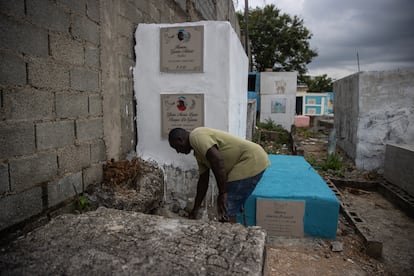
To date, the Prosecutor’s Office has received at least 25 complaints against the owners, and other lawsuits against the state and city officials. Twenty-two of these are hybrid lawsuits, meaning that, in addition to punitive damages, they seek financial compensation for direct and indirect victims. They are being represented by Félix Portes, a well-known criminal lawyer in the country. Portes insists on dismantling the statements of President Luis Abinader, who in one of his weekly press conferences said that there was a “legal vacuum” and that, therefore, liability was somewhat slippery. “The defense teams of the state and of Espaillat are washing their hands, and that is an alarming re-victimization. There is a very clear shared responsibility, yet no one is taking responsibility,” he adds.
Portes asserts that the victims’ demands are all the same: “They demand justice. There’s a lot of outrage because everyone keeps saying, ‘How is it possible there was help in case of a hurricane, and now there’s nothing?’” None of the 20 residents and victims interviewed by this newspaper have received any financial assistance from the state to cover the cost of medicines, orthopedic beds, or canes that are now abundant in Haina. The mayor, Osvaldo Rodríguez, of the ruling party, stated that “they are in the process” of working that out.
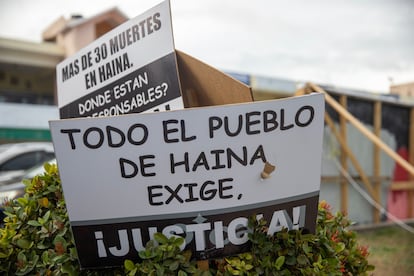
Ever since the collapse, Espaillat has only granted one interview, to the Dominican journalist Edith Febles. Espaillat, who is also the owner of 50 radio stations in the country, denied any negligence and stated that he is in contact with several affected families and is looking into “how we can help.” Regarding criticism of the excessive weight of the roof — as seen in previous overhead images — the businessman clarified that no additional weight had been added over the years. “If this could have been avoided, I would have tried to prevent it,” he insisted.
Furthermore, of the 23 workers on shift that night, six died. “There were regular employees and others we called in during the day,” he explained, without providing many details about the compensation payments. The son of one of them has demanded that Espaillat go to jail and compensate the family with 50 million pesos, approximately $12,000.
Espaillat also played down comments posted in Google reviews as long as seven years ago that described a “little sand” falling from the ceiling, which several of the survivors of the recent tragedy also mentioned. Days after the collapse, a couple of singers admitted they had refused to sing there again for fear of something like this happening. The owner claimed it was coming from the plaster ceiling and that it was a common occurrence. The businessman declined an interview request by EL PAÍS.
His public statements have raised new questions in a country accustomed to impunity, and now wondering whether justice will be served against a powerful businessman in this case.
‘It’s not just the pain of families; it’s the pain of a people’
The facade of the Peguero family home is now dominated by a photo of Clarisleny, wearing a dress and smiling at the camera. This is how they want to remember her: cheerful, always looking her best, and studious. “Her grandfather recently said she was like the little lights on a Christmas tree,” says Sorayda Peguero, her aunt. “I know that when someone dies, everyone comes out and says they were wonderful, but my niece was the joy of the house. She was very special... You can feel the emptiness.” Rafael Amador, one of the Haineros Dorados, takes out his cell phone to answer the question of how he will remember his lifelong friends. “I’m going to think of them like this,” he says, showing a video of one of the many birthday parties that were held at the establishment.
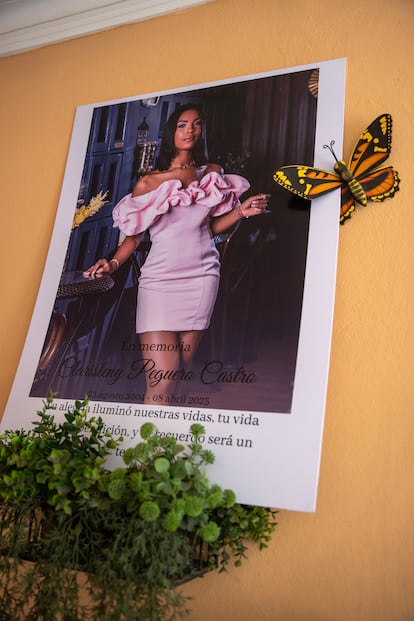
This group of elderly friends lost 11 of its most active members. The blow has been tremendous, both due to its magnitude and because all of them could have ended up under the rubble. “We used to get together to dance and have a good time,” explains Héctor Rincón, president of the group. “We were all invited; they were celebrating the birthday of one of our friends. We might not be here right now.” The reasons why many stayed home that night — mourning a brother-in-law or an early trip the next day — now take on a miraculous aura. “God writes the day on which it is for us to say goodbye,” Rincón says before breaking down.
Segundo Maldonado, head of the Haina Cultural Center, doesn’t hide his anger at the institutional silence. “We’ve had to answer many questions from children and teenagers who also don’t understand anything. Politicians talk about providing support and psychologists to families. And who helps us process it? They think that only families experience grief, but that’s not the case. It’s the grief of an entire community,” he explains emotionally. “We lost friends, musicians, extremely important people in the cultural structure of Haina. We’re devastated.”
The area surrounding Jet Set has been packed with people since the morning of April 8. Hundreds of photos, burnt-out and newly lit candles, dried and fresh flowers, and signs calling for justice surround a nightclub guarded day and night by soldiers. In the background, the billboard advertising a Rubby Pérez concert remains intact. “Look at him there, daddy,” a woman says to her father, pointing to one of the black-and-white images on the floor. “Máximo Peña, there he is, my friend… Poor thing,” she says after a bitter sigh.
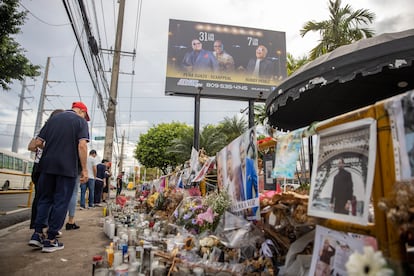
In the background, a woman leads her grandson by the hand as she explains that this tragedy could have been avoided. She does so as if interpreting a museum exhibit aloud. And for many, it is. The ruins of this building are a tangible reminder of the country’s most painful recent episode, one that cries out for justice and remembrance. “I only ask that we never forget this and that something like this never happens again,” Peguero laments. “They took my daughter and all the dreams she had left unfulfilled. Hers and those of many others... We will not forget.”
Sign up for our weekly newsletter to get more English-language news coverage from EL PAÍS USA Edition
Tu suscripción se está usando en otro dispositivo
¿Quieres añadir otro usuario a tu suscripción?
Si continúas leyendo en este dispositivo, no se podrá leer en el otro.
FlechaTu suscripción se está usando en otro dispositivo y solo puedes acceder a EL PAÍS desde un dispositivo a la vez.
Si quieres compartir tu cuenta, cambia tu suscripción a la modalidad Premium, así podrás añadir otro usuario. Cada uno accederá con su propia cuenta de email, lo que os permitirá personalizar vuestra experiencia en EL PAÍS.
¿Tienes una suscripción de empresa? Accede aquí para contratar más cuentas.
En el caso de no saber quién está usando tu cuenta, te recomendamos cambiar tu contraseña aquí.
Si decides continuar compartiendo tu cuenta, este mensaje se mostrará en tu dispositivo y en el de la otra persona que está usando tu cuenta de forma indefinida, afectando a tu experiencia de lectura. Puedes consultar aquí los términos y condiciones de la suscripción digital.








































